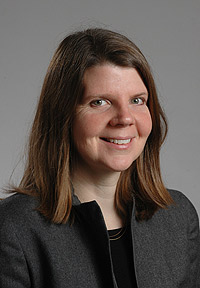Berkeleyan
Aviation engineer wins MacArthur 'genius' award
![]()
| 28 September 2006
As briefly noted in last week's issue, a Berkeley engineer studying hybrid control systems to address problems in aircraft flight control and collision avoidance has won one of this year's MacArthur Foundation "genius" Fellowships.
 Claire Tomlin (Peg Skorpinski photo) |
Claire Tomlin, an associate professor of electrical engineering and computer sciences, is one of 25 recipients of the coveted award, which comes with a $500,000 "no strings attached" grant over the next five years.
The MacArthur Fellowships, also known as "genius" awards, were announced Tuesday, Sept. 19. Recipients are chosen for their creativity, originality, and potential to make important contributions in the future.
Tomlin, 37, is the 40th Berkeley researcher to have received the award since the fellowships first were given out in 1981. Twenty-nine recipients are still at Berkeley.
"Selection for a MacArthur Fellowship is the culmination of an intensive review of the creative efforts and promise of each fellow," said MacArthur President Jonathan Fanton. "Our call comes as a complete surprise and offers the new fellows the gift of time and an unfettered opportunity to reflect, explore, and create."
Tomlin confirmed the surprise element involved. "I couldn't really fathom it," she said of the call from the MacArthur Foundation. "It's something I wasn't expecting."
Tomlin, who also holds a faculty appointment at Stanford University's Department of Aeronautics and Astronautics, is studying aeronautical applications of hybrid systems research, particularly aircraft flight control and air-traffic conflict resolution. She has developed algorithms to help determine when unsafe conditions may arise as variables and interactions become increasingly complex. Her work includes issues of autonomous control of a team of unmanned aerial vehicles.
Her research holds potential applications in fields ranging from military operations to business strategies to power-grid control.
More recently, Tomlin has expanded her research on control theory to the differentiation and development in biological tissues. Tomlin used mathematical models to predict the production of proteins by genes in a recent paper in the journal Science that was co-authored with Jeffrey Axelrod, associate professor of pathology at Stanford.
Fundamentally, both flight control and biological cell networks involve continuous dynamics that are associated with each discrete stage within the system. In biology, stages change as genes are switched on and off. On commercial aircraft, there are different modes of auto-pilot, ranging from cruise control to landing to altitude change mode. "They are all connected through mathematical modeling," says Tomlin.
Tomlin says she plans to use part of her MacArthur grant to boost her background in the life sciences by taking courses in developmental and experimental biology.
Tomlin received her bachelor's degree in electrical engineering at the University of Waterloo in Ontario, Canada, in 1992. A year later, she earned her master's degree in electrical engineering from Imperial College, London. She completed her doctoral studies in electrical engineering and computer sciences at Berkeley, earning her Ph.D. in 1998.

